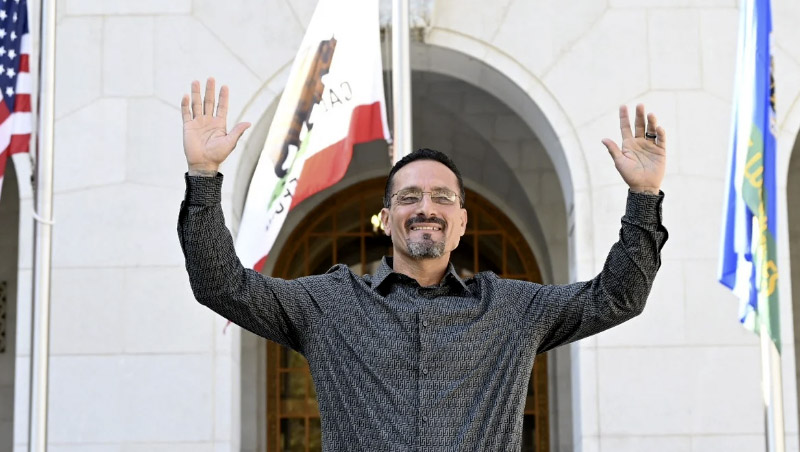
CWSL’s California Innocence Project Secures 40th Exoneration

After 28 years in prison for crimes he didn’t commit, Gerardo Cabanillas is free, thanks to the dedicated team of attorneys and students in California Western’s California Innocence Project (CIP) clinic.
Today, the Los Angeles County District Attorney George Gascón announced Cabanillas’s exoneration, which was approved last Thursday by Judge William Ryan. In a courtroom packed with Gerardo’s family, friends, and advocates, Judge Ryan called it “a day long coming” and officially reversed Cabanillas’s judgment, declared him factually innocent, and called for the monitor on Gerardo’s ankle—the last vestige of his improper imprisonment—to be removed.
Gerardo had been out of prison since May of this year, while his case was being resolved, but now he is entirely free of the system that has unjustly incarcerated him since he was 18 years old. The audience burst into applause and tears.
Today’s victory comes as a result of Gerardo’s persistence in finding people who would believe in his innocence. It wasn’t until 2017, after multiple unsuccessful appeals, that Gerardo reached out to CIP, and found the legal advocates he needed.
Alissa Bjerkhoel, the Interim Director of CIP and Gerardo’s lead attorney, noted before the court that “it takes one person to put someone away, but it takes a team of defenders to get someone out,” acknowledging the participation of CIP’s staff and the students who worked on Gerardo’s case while part of the clinic, including Camille Cruz (‘18-’19), Dakota Hickingbottom (’19-’20), Daisy Mendez, (‘20-’21), Alexis Holbrook, (‘21-’22), and Michaela Baker (‘22-23).
After careful review of the case and after Gerardo's case worked its way through CIP’s extensive screening process, CIP staff decided in 2019 that there were enough questions about the legitimacy of Gerardo’s conviction to investigate more deeply. The team arranged for new DNA analysis, none of which tied Gerardo to the case; re-interviewed witnesses, who had long believed that Mr. Cabanillas was innocent; and reached out to a linguistics professor, who concluded that Gerardo’s confession was “more than likely a false confession.”
This case is the first in CIP’s 24 years that involved a false confession. Gerardo claimed, even before his first trial began, that he had been coerced into making a false confession, promised that he would go free if he did, and fed him all of the information about the crimes during his interrogation and throughout his supposed confession.
In true CIP fashion, the false confessions expert, Dr. Philip Gaines was a volunteer with the program, who’d stumbled onto the CIP website and offered his services should they ever be needed. He was also in attendance on Thursday and said he’d been “waiting for this moment for 15 years,” to see his years of study contribute to an exoneration.
Michaela Baker, who is now a 3L, was also in attendance and one of a select few who were able to witness the removal of Gerardo’s ankle monitor, because she had been so intimately involved in his case. On several occasions, she’d driving across the state to Corcoran State Prison to update Gerardo and get his signature on court filings. Ms. Baker was also there in May, the day that he was released from prison, and lauded Gerardo for his “incredible patience and perseverance.”
In the months since his release, Gerardo has begun the slow work of reintegrating into society. He’s been especially helped by his wife and daughter and tremendously heartened by the opportunity to reunite with his eldest daughter, who was one when he was incarcerated and had had no contact with her father until these last two years. When asked what he would do with his freedom, Gerardo, who is quiet and mild-mannered, said with a smile, “Just enjoy life.”
Thanks to CIP, he can now do exactly that.
